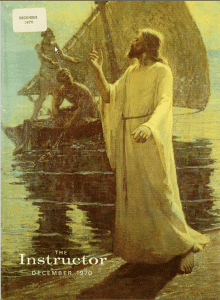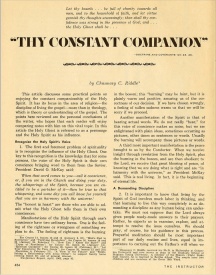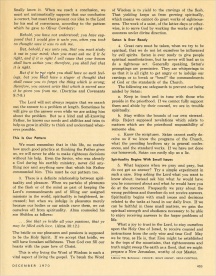Let thy bowels … be full of charity toward all men, and to the household of faith, and lt virtue garnish thy thoughts unceasingly; then shall thy confidence wax strong in the presence of God; and … the Holy Ghost shall be …
“THY CONSTANT COMPANION”
Doctrine & Covenants 121:45-46
The Instructor, December, 1970
by Chauncey D. Riddle
Chauncey C. Riddle received his Ph.D. in Philosophy at Columbia University and now serves as dean of the Graduate School at Brigham Young University. A member of the Sharon (Utah) Stake high council, he is married to Bertha Allred. The couple have two children and are members of the Orem 16th Ward.
This article discusses some practical points on enjoying the constant companionship of the Holy Spirit. It has its focus in the area of religion — the discipline of living the gospel — more than in theology, which is theory or understanding of the gospel. The points here reviewed are the personal conclusions of the writer, who hopes that each reader will enjoy comparing notes with him on this vital topic. In this article the Holy Ghost is referred to as a personage and the Holy Spirit as his influence.
Recognize the Holy Spirit’s Voice
1. The first and foremost problem of spirituality is to recognize the influence of the Holy Ghost. One key to this recognition is the knowledge that for some person, the voice of the Holy Spirit is their own conscience bringing word to them from the Savior. President David O. McKay said:
When that word comes to you — call it conscience, or, if you are in the Church and doing your duty, the whisperings of the Spirit, because you are entitled to be a partaker of it — then be true to that whispering, and some day you will know for yourself that you are in harmony with the universe. (Conference Report, April, 1963, page 95)
The “honest in heart” are those who are able to admit what the Holy Ghost tells them in their own consciences.
Manifestations of the Holy Spirit through one’s conscience have two ordinary forms. One is the feeling of the rightness or wrongness of something we plan to do. The feeling of rightness is the burning in the bosom; this “burning” may be faint, but it is plainly warm and positive, assuring us of the correctness of our decision. If we have chosen wrongly. a feeling of sullen sadness warns us that we will be sorry if we proceed.
Another manifestation of the Spirit is that of hearing actual words. We do not really “hear.” for this voice of conscience makes no noise, but we are enlightened with plain ideas, sometimes occurring as pictures, other times as sentences or words. Usually the burning will accompany these pictures or words.
A third most important manifestation is the peace brought to us by the Comforter. When we receive insight through revelation from the Holy spirit, plus the burning in the bosom, and are then obedient to the Lord, we receive that great blessing of peace, of knowing, that we are doing what is right and are “in harmony with the universe,” as President McKay said. This is real living. In fact, it is the beginning of eternal life.
A Demanding Discipline
2. It is important to know that living by the Spirit of God involves much labor in thinking, and that learning to live this way completely is as demanding a discipline as any human being can undertake. We must not suppose that the Lord always gives people ready-made answers to their prayers. Rather, he expects us to examine, explore, and attempt to resolve the issue ourselves. We should pray, of course, for his guidance in this process. Prayerful meditation should be most important part of our daily routine and lives, equal in importance to carrying out the Father’s will when we finally know it. When we reach a conclusion, we must not automatically suppose that our conclusion is correct, but must then present our idea to the Lord for his seal of correctness, according to the pattern which he gave to Oliver Cowdery:
Behold, you have not understood; you have supposed that I would give it unto you, when you took no thought save it was to ask me.
But, behold, I say unto you, that you must study it out in your mind; then you must ask me if it be right, and if it is right I will cause that your bosom shall burn within you; therefore, you shall feel that it is right.
But if it be not right you shall have no such feelings, but you shall have a stupor of thought that shall cause you to forget the things which is wrong; therefore, you cannot write that which is sacred save it be given you from me. (Doctrine & Covenants 9:7-9.)
The Lord will not always require that we search out the answer to a problem at length. Sometimes he will give us the answer even while we are asking him about the problem. But as a kind and all-knowing Father, he knows our needs and abilities and tries to help us grow in ability to think and understand whenever possible.
This is Our Pattern
We must remember that in this life, no matter how much good practice at thinking the Father gives us, we will never be able to make righteous decisions without his help. Even the Savior, who was already a God during his earthly ministry, never did anything nor said anything save that which his Father commanded him. This must be our pattern too.
3. There is a definite relationship between spirituality and pleasure. When we partake of pleasures of the flesh or of the mind as part of keeping the Lord’s commandments and of filling our assigned missions in the world, spirituality is heightened, increased; but when we indulge in pleasures merely because our bodies or our minds crave them, we cut ourselves off from spirituality. Alma counseled his son Shiblon as follows:
… See that ye bridle all your passions, that ye may be filled with love. (Alma 38:12.)
The bridle on our pleasures and passions is supposed to be the Holy Spirit. If we accept that bridle, we will have forsaken selfishness. Then God can fill our hearts with the pure love of Christ.
This is why living the Word of Wisdom is such a full aspect of living the gospel. To break the Word of Wisdom is to yield to the craving of the flesh. That yielding keeps us from growing spiritually, which means we cannot do great works of righteousness. The work of a saint, of the latter-days or otherwise, is to serve God by working the works of righteousness under divine direction.
Satan is Ever Ready
4. Great care must be taken, when we try to be spiritual, that we do not let ourselves be influenced by evil spirits. Satan is ever ready to give people spiritual manifestations, but he never will lead us to do a righteous act. Generally speaking, Satan’s promptings are permissive. They are whisperings to us that it is all right to get angry or to indulge our cravings or to break or “bend” the commandments of God or the standards of the Church.
The following are safeguards to prevent our being misled by Satan:
a. Keep in touch and in tune with those who preside in the priesthood. If we cannot fully support them and abide by their counsel, we are in trouble spiritually.
b. Stay within the bonds of our own stewardship. Reject supposed revelations which relate to matters which are the priesthood responsibility of someone else.
c. Know the scriptures. Satan cannot easily deceive us if we know the programs of the Church, what the presiding brethren say in general conferences, and the standard works, If we have not done our homework, Satan can easily slip us a lie.
Spirituality Begins With Small Issues
5. What happens when we pray and pray, but do not get an answer? Try a simple experiment in such a case. Stop asking the Lord what you want to know about; instead ask him what he would have you be concerned about and what he should have you do at the moment. Frequently we pray about the wrong problems and therefore do not receive answers. Spirituality begins with small issues and decisions related to the tasks at hand in our daily lives. If we can be faithful in these small matters, we gain the spiritual strength and obedience necessary to be able to enjoy receiving answers to the larger problems of life.
What a joy to trust in the Lord, to stay ourselves upon the Holy One of Israel, to receive counsel and instructions from the only wise and true God! May we be true, as He is, that Zion might be established in the tops of the mountains, that righteousness and truth might sweep the earth as a flood, that we might prepare a New Jerusalem, worthy of our Master.



